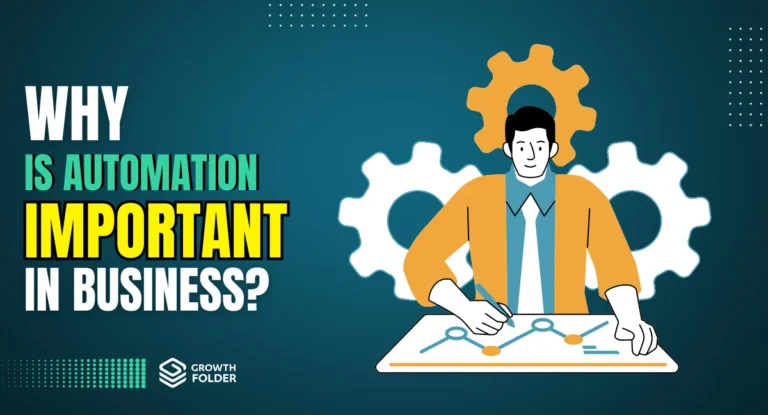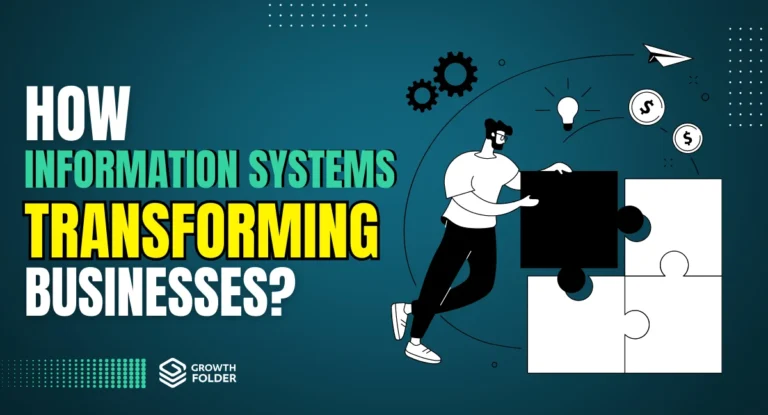
Imagine your organisation as a finely tuned orchestra, with each department playing its part in harmony to create a symphony of success.
But what happens when the sheet music gets lost, the conductor misses a beat, or the musicians can’t hear each other?

Chaos ensues, and the once harmonious tune turns into a cacophony.🤤
Things can go south pretty quickly, and all you can do is just witness it happening.
Enter the Enterprise Resource Planning (ERP) systems, the maestros of the business world, wielding the baton to orchestrate seamless collaboration, fine-tune processes, and hit all the right notes for a standing ovation-worthy performance.
In this article, we’ll explore why ERP is important for an organisation and dive deep into the crescendo of benefits ERP systems offer, striking a chord with organisations eager to transform their operations and achieve a chart-topping performance.
What is ERP?

Enterprise Resource Planning (ERP) is a comprehensive software solution that integrates and streamlines various business processes and functions within an organisation.
By consolidating data and automating workflows, ERP systems enable organisations to manage their resources more efficiently, improve communication and collaboration, and make better-informed decisions.
History and Evolution of ERP
The origins of ERP can be traced back to the 1960s when Material Requirements Planning (MRP) systems were developed to manage manufacturing processes.
MRP systems focused on inventory control, production scheduling, and purchasing, helping businesses to optimize their manufacturing operations.
As technology advanced and businesses evolved, the need for more comprehensive systems emerged.
In the 1980s, MRP systems evolved into Manufacturing Resource Planning (MRP II) systems, which expanded the scope beyond material planning to include other aspects of manufacturing, such as capacity planning, shop floor control, and financial management.
The term “Enterprise Resource Planning” was coined in the early 1990s when these systems further expanded to encompass a broader range of business functions.
Modern ERP systems include core modules such as:
- Financial management
- Human resources management
- Supply chain management
- Customer relationship management
- Manufacturing and production planning
Over time, ERP systems have become more sophisticated and adaptable, offering greater customization and integration capabilities to meet the unique needs of businesses across different industries.
The rise of cloud computing and mobile technologies in the 21st century has led to the development of cloud-based and mobile ERP solutions.
These modern ERP systems offer increased flexibility, accessibility, and scalability, making them an attractive option for businesses of all sizes.
Which industries can benefit from ERP?

ERP systems are versatile and adaptable, making them suitable for a wide range of industries.
By offering customizable modules and integration capabilities, ERP solutions can be tailored to meet the specific needs and challenges of various sectors.
Here are some industries that can benefit significantly from implementing ERP systems:
- Manufacturing: ERP systems can streamline production processes, inventory management, and quality control, helping manufacturers optimize their operations, reduce costs, and improve customer satisfaction.
- Retail: Retail businesses can use ERP systems to manage inventory levels, track sales, and automate purchasing. This leads to better stock control, reduced stockouts, and improved customer service.
- Healthcare: ERP solutions can help healthcare organisations manage patient information, billing, and regulatory compliance. They can also support efficient resource allocation, such as staff scheduling and supply management.
- Construction: Construction companies can benefit from ERP systems by improving project management, resource allocation, and financial management. This enables better cost control, timely project completion, and enhanced collaboration among stakeholders.
- Education: Educational institutions can use ERP systems to manage student information, admissions, scheduling, and resource allocation. This results in streamlined administration and improved decision-making.
- Logistics and transportation: ERP systems can optimize supply chain operations, manage inventory and warehousing, and streamline transportation management for logistics and transportation companies. This leads to improved operational efficiency and cost reduction.
- Professional services: Service-oriented businesses, such as consulting firms, law firms, and advertising agencies, can use ERP systems to manage client information, track projects, and handle financial management, leading to enhanced collaboration and resource utilization.
- Hospitality: Hotels, restaurants, and other hospitality businesses can use ERP systems to manage reservations, inventory, and staff scheduling, resulting in better customer service and optimized operations.
- Nonprofit organizations: Nonprofits can benefit from ERP systems by streamlining financial management, grant management, and donor relations, enabling them to focus on their mission and make better use of their resources.
- Government agencies: Public sector organizations can use ERP systems to improve financial management, procurement, and human resources management, leading to increased transparency and efficient public service delivery.
Why is ERP important for your business?

As a savvy business leader, you’re always on the lookout for ways to outsmart the competition, streamline operations, and foster growth.
Picture this: a single solution that unifies your organization, turning chaos into harmony and transforming stumbling blocks into stepping stones.
This powerful tool is none other than Enterprise Resource Planning (ERP), and it’s ready to become your business’s secret weapon.
Here, we’ll delve into the heart of ERP and uncover the multitude of reasons why it’s a game-changer for businesses, regardless of their size or industry.
So fasten your seatbelts as we explore the impressive capabilities and benefits that make ERP an indispensable asset for your organization.
Centralized Data Management

One of the key reasons why ERP is important for an organization is its ability to centralize data management.
ERP systems serve as a single source of truth, eliminating data redundancy and inconsistencies and ensuring data accuracy and integrity.
Centralized Data Management brings together data from various departments and functions within an organization into a single, unified platform.
This consolidated approach to data management offers several advantages:
- Improved Decision-Making: With centralized data management, businesses can access real-time information and gain a holistic view of their operations. This enables managers and executives to make informed decisions based on accurate and up-to-date data, ultimately driving better business outcomes.
- Reduced Errors and Data Redundancy: By maintaining a single source of truth, ERP systems minimize the risk of errors and inconsistencies that can arise from having multiple copies of data across different systems. This ensures that everyone within the organization is working with accurate and consistent information.
- Streamlined Reporting: Centralized data management simplifies reporting processes by providing a unified platform for generating reports and business intelligence insights. This reduces the time and effort required to gather and analyze data from various sources, enabling organizations to be more agile and responsive.
- Increased Efficiency: With all data stored in a central repository, employees can easily access and share information, leading to more efficient workflows and reduced administrative tasks. This, in turn, frees up resources that can be dedicated to higher-value activities.
- Enhanced Data Security: Centralizing data management within an ERP system allows organizations to implement robust security measures, such as access controls and encryption, to protect sensitive data from unauthorized access and potential breaches.
Consider a medium-sized enterprise with multiple departments, each using its software solutions to manage operations.
This often leads to data silos, resulting in inaccurate and inconsistent information across the organization.
By implementing an ERP system, the enterprise can consolidate its data into a single platform, improving overall data quality and decision-making.
For example, an e-commerce company using an ERP system can easily access up-to-date information on inventory levels, sales, and customer interactions, allowing them to make informed decisions on marketing campaigns, product restocking, and customer service improvements.
Business Process Automation

Business Process Automation (BPA) is the use of technology to automate repetitive and time-consuming tasks, allowing organizations to streamline their operations, improve efficiency, and reduce manual workloads.
In the context of Enterprise Resource Planning (ERP) systems, BPA plays a vital role in enhancing business performance across various departments and functions.
Here are some key advantages of Business Process Automation:
- Increased Efficiency: By automating tasks such as data entry, invoicing, and purchase order generation, organizations can significantly reduce the time and effort required to complete these activities. This frees up employees to focus on higher-value tasks, ultimately improving overall productivity.
- Reduced Errors: Manual processes are prone to human errors, which can lead to inaccuracies and inconsistencies in data. Automation reduces the likelihood of such errors, ensuring higher data quality and more reliable decision-making.
- Cost Savings: Automating manual tasks can result in cost savings for organizations, as it reduces the need for additional staff to handle repetitive tasks and minimizes the potential for costly errors.
- Scalability: As businesses grow, the volume of tasks and processes can increase significantly. Business Process Automation allows organizations to scale their operations more easily, as automated processes can handle larger volumes of work without requiring additional resources.
- Standardization and Compliance: Automated processes follow predefined rules and guidelines, ensuring consistency and adherence to industry standards and regulatory requirements.
For instance, consider a financial services company that implements an ERP system to automate its accounts payable and receivable processes.
By automating invoice generation, payment processing, and account reconciliation, the company can reduce manual workloads, minimize errors, and ensure timely and accurate financial reporting.
This not only improves the company’s operational efficiency but also enhances its ability to make data-driven decisions and maintain regulatory compliance.
Enhancing Collaboration Across Departments

Breaking down departmental silos and fostering collaboration is another reason why ERP is important for an organization.
By streamlining communication and knowledge sharing across departments, ERP systems promote better cooperation and more efficient problem-solving.
Here are some key advantages of enhancing collaboration across departments using ERP systems:
- Improved Communication: With a centralized platform for sharing information, employees from different departments can easily communicate and collaborate on projects, tasks, and processes. This leads to better decision-making and more efficient workflows.
- Increased Visibility: ERP systems offer real-time access to data and insights, enabling employees to monitor the progress of projects, tasks, and processes across various departments. This increased visibility helps identify potential bottlenecks, streamline operations, and improve overall performance.
- Faster Problem Solving: By fostering collaboration, ERP systems enable employees to quickly identify and address issues, reducing the time it takes to resolve problems and minimizing their impact on the organization.
- Higher Employee Engagement: When employees from different departments work together towards common goals, they feel more engaged and motivated, leading to higher job satisfaction and increased productivity.
- Innovation and Creativity: Cross-functional collaboration can drive innovation and creativity by bringing together diverse perspectives, skills, and experiences. This can lead to the development of new products, services, and solutions that can help organizations stay ahead in the competitive market.
For instance, imagine a manufacturing company where the sales, production, and procurement departments work in silos.
This can lead to issues such as stockouts, overproduction, and delayed deliveries.
Implementing an ERP system allows these departments to access real-time data and collaborate effectively, ultimately improving overall operational efficiency and customer satisfaction.
Aligning Business Strategy and Execution

ERP systems help organizations align their strategic goals with operational activities, ensuring that everyone works towards a common objective.
Not only on the paper, but this makes sure that the strategies are getting translated into day-to-day operations.
By providing improved performance tracking and Key Performance Indicators (KPI) monitoring, ERP systems support agile decision-making and continuous improvement.
Here are some key advantages of aligning business strategy and execution using ERP systems:
- Informed Decision-Making: By offering real-time data and insights, ERP systems enable organizations to make informed decisions that align with their strategic objectives. This ensures that resources are allocated effectively and the organization stays on track to achieve its goals.
- Performance Tracking: ERP systems provide tools to track and measure key performance indicators (KPIs), allowing organizations to monitor their progress toward strategic goals and identify areas for improvement.
- Increased Agility: With access to up-to-date information, organizations can quickly adapt to changing market conditions, customer demands, or internal challenges. This increased agility enables businesses to respond more effectively to opportunities and threats, ensuring their strategies remain relevant and effective.
- Resource Optimization: Aligning business strategy and execution helps organizations optimize the use of their resources, including personnel, assets, and budgets. By allocating resources strategically, businesses can maximize their return on investment and improve overall efficiency.
- Clearer Accountability: ERP systems enable organizations to establish clear goals, assign responsibilities, and track progress, fostering a culture of accountability and performance-driven decision-making.
For instance, a majority of retail chains implement ERP systems to track sales performance, inventory levels, and customer data.
By analyzing this information, the company can identify trends, spot opportunities, and make data-driven decisions to align its product offerings, marketing campaigns, and supply chain operations with its strategic objectives.
This ensures that the organization remains competitive, responsive to customer needs, and well-positioned for growth.
Customization and Integration Capabilities

ERP systems allow businesses to tailor the system to their specific needs and processes.
These capabilities ensure that the ERP solution aligns with the organization’s unique requirements and can be seamlessly integrated with existing systems and software.
Here are some key advantages of customization and integration capabilities in ERP systems:
- Tailored Solutions: Customization capabilities enable organizations to adapt the ERP system to their specific business processes, industry requirements, and organizational structures. This ensures that the system is well-suited to the organization’s needs and can effectively support its operations.
- Increased Flexibility: With the ability to customize and integrate ERP systems, organizations can easily adapt their processes and systems as their business evolves. This flexibility allows businesses to stay agile and respond to changes in the market, customer demands, or internal requirements.
- Streamlined Operations: Integrating ERP systems with existing software and tools, such as CRM systems, e-commerce platforms, or supply chain management solutions, helps create a seamless flow of information between different applications. These streamlines operations and reduces the need for manual data entry or duplicate processes.
- Improved Data Accuracy and Consistency: Integrating ERP systems with other software ensures that data is automatically updated and synchronized across all platforms. This results in increased data accuracy, reduced errors, and improved decision-making.
- Better ROI: Customizing and integrating an ERP system allows organizations to leverage their existing software investments and ensure that all tools work together effectively. This can lead to improved efficiency, reduced costs, and a better return on investment (ROI) for the ERP implementation.
A healthcare organization, for example, may require specialized modules for patient management and regulatory compliance.
By customizing its ERP system and integrating it with other healthcare-specific software, the organization can create a comprehensive solution that addresses all its needs.
Securing Your Organization’s Data and Intellectual Property

Data security and privacy have become top priorities for businesses, and ERP systems play a crucial role in enhanced sensitive data protection from unauthorized access, data breaches, and cyber threats.
With robust access controls, monitoring, and encryption features, ERP systems ensure the security of your organization’s data and intellectual property.
Given the central role that ERP systems play in managing a company’s data and processes, it is essential to ensure robust security measures are in place.
Here are some key advantages of securing your organization’s data and intellectual property using ERP systems:
- Access Controls: ERP systems typically offer granular access controls, allowing organizations to define user roles and permissions, restrict access to sensitive information, and ensure that employees can only access the data they need to perform their job functions.
- Data Encryption: Many ERP systems provide data encryption capabilities, which ensure that sensitive information is securely stored and transmitted within the system. This reduces the risk of unauthorized access and protects the organization’s data from potential breaches.
- Audit Trails: ERP systems often include audit trail functionality, enabling organizations to track and monitor user activities within the system. This provides greater visibility into system usage and helps identify potential security risks or suspicious activities.
- Regular Updates and Patches: ERP vendors typically provide regular software updates and security patches to address potential vulnerabilities and maintain the system’s security. Keeping the ERP system up to date is crucial for ensuring ongoing protection against emerging threats.
- Compliance with Industry Regulations: Implementing robust security measures within an ERP system can help organizations comply with industry-specific regulations and data protection standards, such as GDPR, HIPAA, or PCI DSS. This is especially important for businesses operating in highly regulated industries, such as healthcare, finance, or e-commerce.
For example, A healthcare provider can implement an ERP system to manage its patient records, billing, and inventory data.
By ensuring robust access controls, data encryption, and regular security updates, the provider can protect sensitive patient information, maintain compliance with HIPAA regulations, and safeguard its reputation in the industry.
In addition to protecting data, ERP systems also help organizations ensure compliance with data protection regulations, such as the General Data Protection Regulation (GDPR) and the California Consumer Privacy Act (CCPA).
Through automated reporting and built-in compliance features, ERP systems can significantly reduce the risk of non-compliance and associated penalties.
How to decide if your business needs an ERP system?

Every business has its pluses and minuses and thus face a different kind of challenge.
So before investing in any ERP system, you should be clear enough to judge whether you actually need this or not.
The following parameters indicate that you need to transform to an ERP system now.
- Growing Complexity: As your business expands and becomes more complex, it may become challenging to manage operations efficiently. An ERP system can streamline processes and improve efficiency, making it easier to manage growth.
- Inefficient Processes: If your business processes are manual, time-consuming, or prone to errors, implementing an ERP system can help automate tasks, reduce errors, and improve overall productivity.
- Limited Visibility: If you lack visibility into your operations, inventory, and financial data, an ERP system can provide real-time insights, allowing you to make informed decisions and optimize resource allocation.
- Data Inconsistencies: If you’re experiencing data inconsistencies across different departments or systems, an ERP system can centralize and standardize data, ensuring accuracy and consistency.
- Customer Service Challenges: If your business struggles to provide timely and accurate customer service, an ERP system can improve communication, automate customer interactions, and provide better access to customer data.
- Regulatory Compliance: If your business operates in a heavily regulated industry or needs to comply with specific data protection standards, an ERP system can help maintain compliance by providing robust security features and audit trails.
- Scaling Challenges: If you anticipate rapid growth or plan to expand into new markets, an ERP system can help you scale your operations more efficiently and provide the flexibility needed to adapt to changing business requirements.
- Integration Needs: If your business relies on multiple software systems that don’t communicate well, an ERP system can integrate these systems, streamlining data flow and improving overall efficiency.
- Limited Reporting and Analysis: If your business lacks comprehensive reporting and analysis tools, an ERP system can provide advanced reporting capabilities, enabling better decision-making and strategic planning.
- Competitive Pressure: If your competitors are using ERP systems to streamline operations and gain a competitive edge, implementing an ERP system can help you stay competitive by improving efficiency, reducing costs, and enhancing customer service.
Types of ERP deployments

In short, ERP deployment involves setting up an ERP software system, transferring data to the new system, adjusting it to fit your organization’s needs, and teaching users how to operate the software effectively.
There are three main types of ERP deployments that organizations can choose from, depending on their specific requirements, budget, and IT infrastructure.
These deployment options are:
On-Premises ERP
On-premises ERP systems are installed locally on an organization’s own hardware and servers and are managed by their internal IT staff.
This type of deployment offers greater control and customization options but typically requires a higher initial investment in infrastructure and ongoing maintenance costs.
On-premises ERP systems are best suited for organizations with complex needs, robust IT resources, and a desire for direct control over their ERP environment.
Cloud-based ERP (Software as a Service)
Cloud-based ERP systems are hosted on a vendor’s servers and accessed via the Internet.
With this deployment option, organizations do not need to invest in hardware and server infrastructure, and maintenance is handled by the vendor.
Cloud-based ERP systems typically offer a lower upfront cost, faster implementation, and greater scalability.
They are well-suited for small to medium-sized businesses, organizations with limited IT resources, or those seeking a more flexible and agile ERP solution.
Hybrid ERP
Hybrid ERP deployments combine elements of both on-premises and cloud-based systems.
In this model, some ERP functions are hosted on-premises, while others are hosted in the cloud.
This approach allows organizations to take advantage of the benefits of both deployment options while addressing specific business needs and IT requirements.
Hybrid ERP systems are a good choice for organizations that want to maintain some control over their ERP environment while also leveraging the flexibility and scalability of cloud-based solutions.
As we have clearly seen that each ERP deployment option has its own set of advantages and disadvantages.
Instead of chasing the same rat, organizations should carefully consider their unique needs, IT resources, and budget constraints before choosing the most suitable ERP deployment option for their business.
popular ERP software recommendations
Now that we have seen why ERP is important for an organization, how to decide if your business needs one, and the types of ERP deployments, you would certainly want to know some of the best ERP software solutions.
To be honest, we haven’t tried all the ERP software by ourselves but would recommend some of the best ones in the market.
Here’s a list of some popular ERP software solutions, catering to a wide range of industries and business sizes:
1. SAP ERP
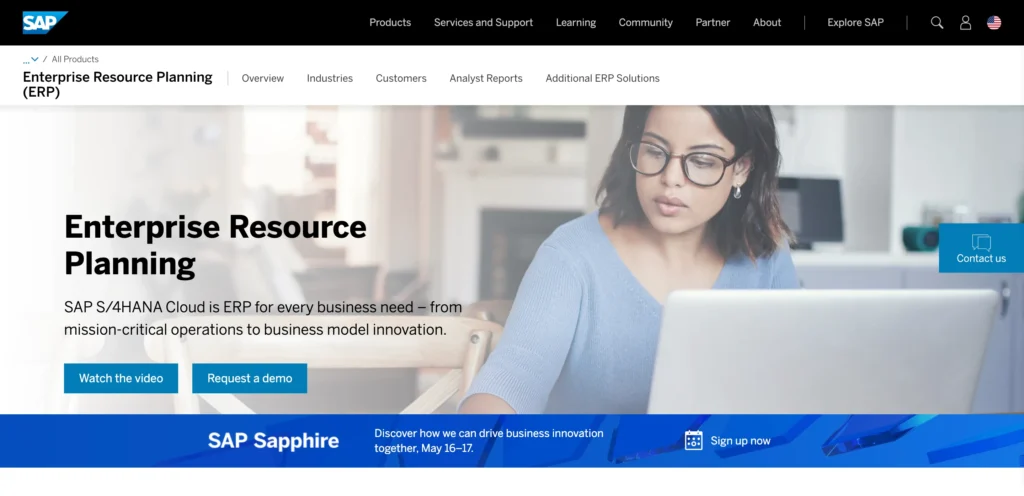
SAP is one of the leading ERP software providers, offering comprehensive solutions for various industries, including manufacturing, retail, and services.
Their flagship product, SAP S/4HANA, is designed for large enterprises, while SAP Business One target small to medium-sized businesses.
2. Oracle NetSuite
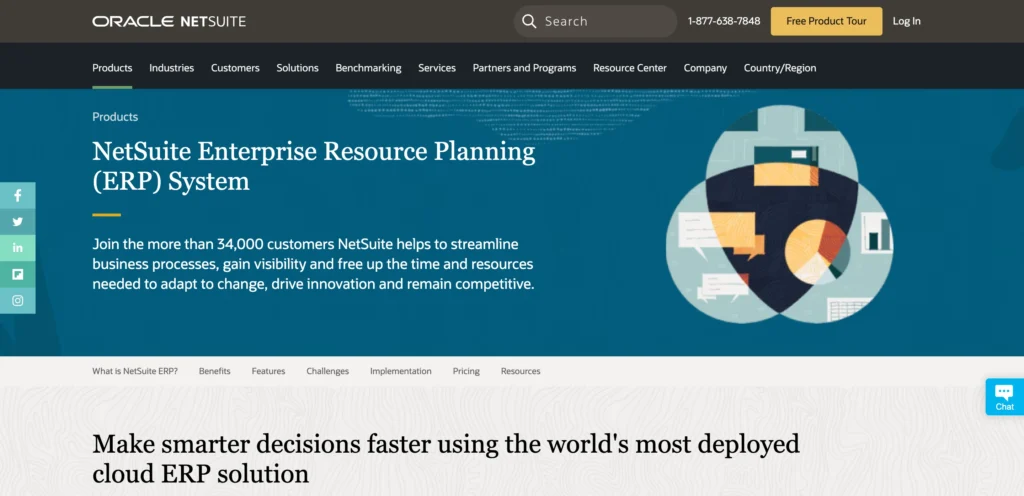
Oracle NetSuite is a cloud-based ERP solution tailored for small to medium-sized businesses.
It offers modules for finance, supply chain management, customer relationship management, and more, providing an integrated solution for managing various business processes.
3. Microsoft Dynamics 365
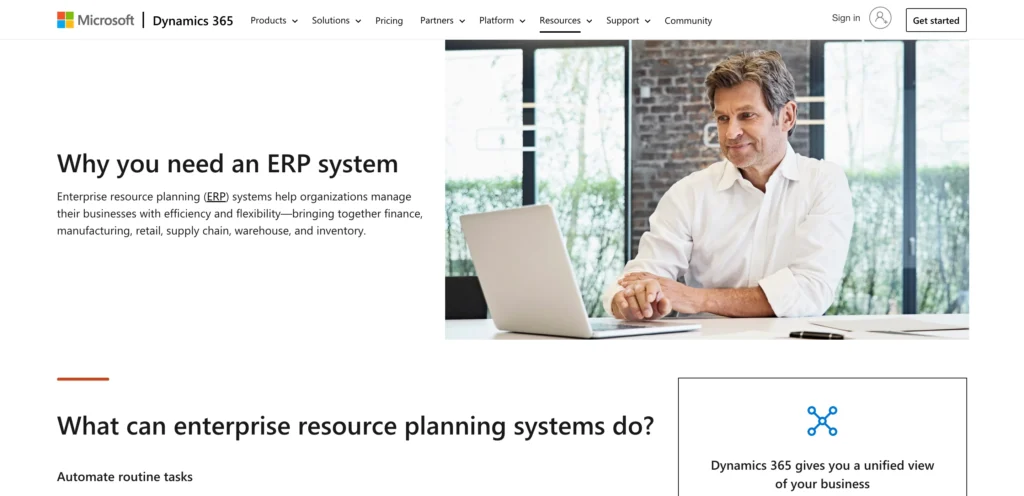
Microsoft Dynamics 365 is a suite of integrated business applications, including ERP, CRM, and other modules.
It is designed for businesses of all sizes and offers a flexible, customizable platform that can be tailored to specific industry needs.
4. Epicor ERP
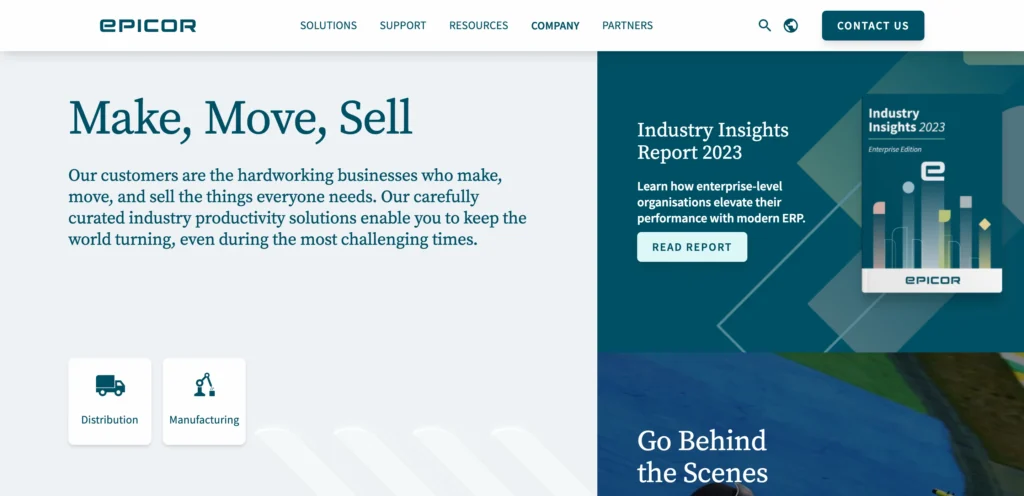
Epicor ERP targets manufacturing, distribution, retail, and services industries, offering robust functionality and flexibility.
It is available both on-premises and in the cloud, catering to the needs of various business sizes and requirements.
5. Infor ERP
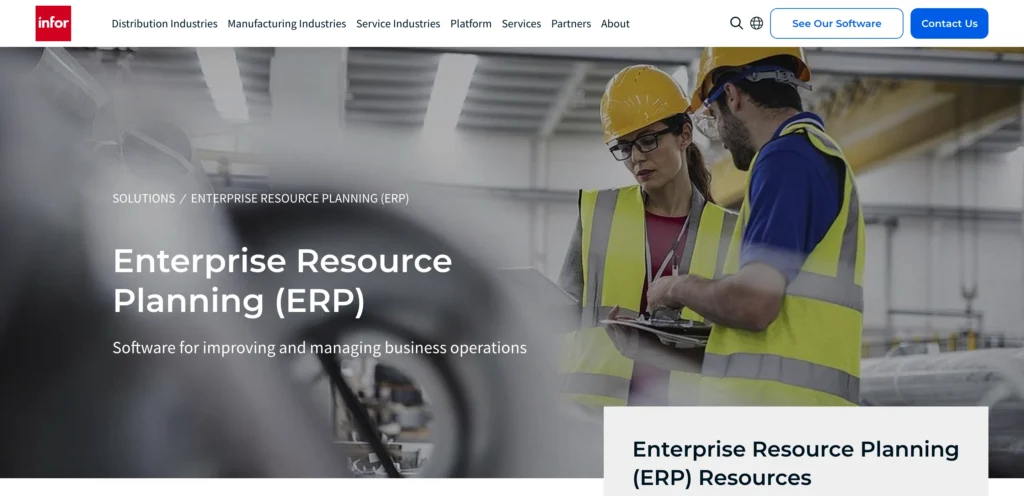
Infor offers a range of ERP solutions designed for specific industries, such as manufacturing, distribution, and healthcare.
Infor CloudSuite is their flagship cloud-based ERP product, offering comprehensive functionality and industry-specific features.
6. Odoo
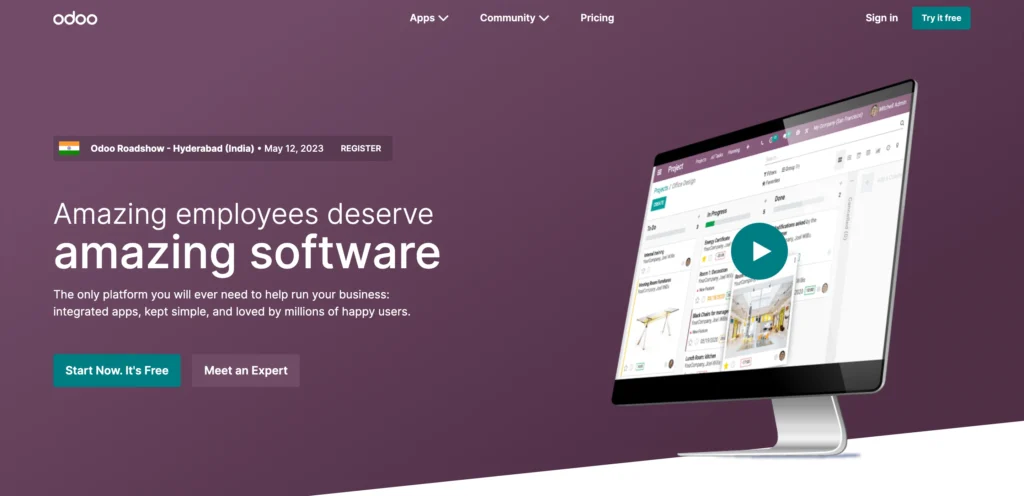
Odoo is an open-source ERP platform that offers a wide range of business applications, including CRM, e-commerce, project management, and more.
Its modular design allows businesses to customize and scale the solution according to their specific needs.
7. Sage X3
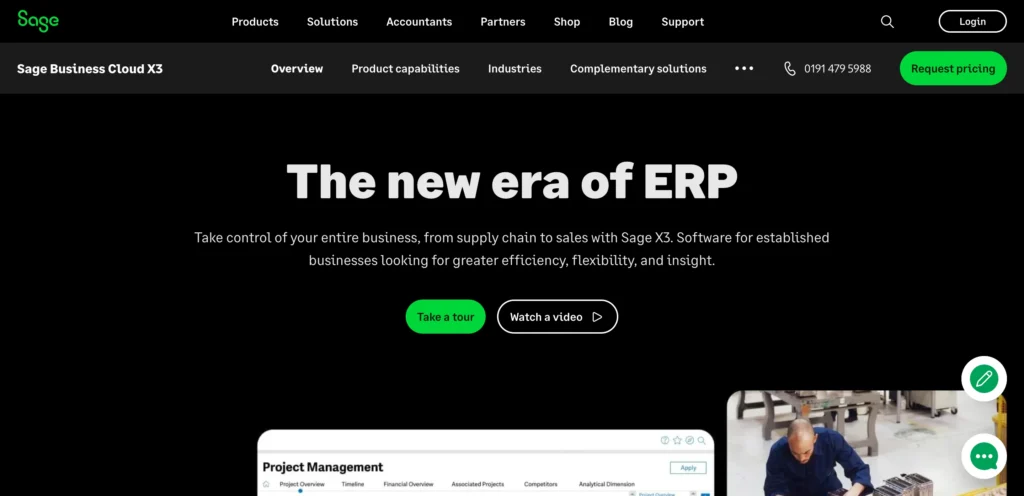
Sage X3 (also known as Sage Business Cloud Enterprise Management) is an ERP solution designed for medium to large-sized enterprises.
It provides comprehensive functionality for finance, distribution, manufacturing, and other industries.
Things to consider when choosing the right ERP software

When choosing an ERP software for your company, it’s important to consider several factors to ensure you select a solution that meets your specific needs, budget, and long-term goals.
Here are some key aspects to consider when evaluating ERP software:
- Business Requirements: Clearly define your organization’s specific needs, pain points, and desired improvements. Identify the key features and functionalities that are essential to streamlining your business processes and addressing your unique challenges.
- Scalability: Choose an ERP system that can grow and adapt to your business. Ensure the software can accommodate future changes, such as increased users, additional modules, or expanded functionality.
- Customization and Flexibility: Evaluate the software’s customization capabilities and its ability to integrate with your existing systems and processes. A flexible and customizable ERP solution can better align with your organization’s specific requirements.
- Ease of Use: Consider the user experience and intuitiveness of the software. Select a solution that is easy for your employees to learn and use, reducing training time and increasing adoption rates.
- Deployment Options: Determine whether an on-premises, cloud-based, or hybrid ERP deployment is best suited for your organization, taking into account your IT resources, budget, and specific needs.
- Vendor Reputation and Experience: Research the vendor’s reputation, customer reviews, and industry experience. Choose a vendor with a proven track record of successful ERP implementations and strong customer support.
- Cost and ROI: Evaluate the total cost of ownership (TCO) of the ERP system, including upfront costs, implementation expenses, ongoing maintenance, and support fees. Consider the potential return on investment (ROI) and the long-term value the system will bring to your organization.
- Security and Compliance: Assess the security features and compliance capabilities of the ERP software, especially if your organization operates in a heavily regulated industry or handles sensitive data.
- Support and Maintenance: Understand the vendor’s support and maintenance offerings, including technical assistance, software updates, and training resources. Strong support can ensure a smooth implementation process and help resolve issues quickly.
- Implementation Timeline: Consider the estimated time required to implement the ERP system, and ensure it aligns with your organization’s timeline and expectations.
Note: To determine the best ERP solution for your organization and unlock its full potential, you may look toward consulting with an ERP expert who can guide you through the evaluation and implementation process.

Conclusion
In conclusion, ERP systems are like the master chefs of the business world, whipping up a delightful concoction of streamlined processes, centralized data, and a mouthwatering efficient workplace.
But much like finding the perfect recipe, selecting the right ERP system for your company requires careful consideration of ingredients, from evaluating business needs to weighing deployment options.
So, take a step back, savor the aroma of potential success, and remember: the right ERP solution can transform your organization into a Michelin-starred masterpiece, providing a delicious feast of growth and innovation for years to come.
Bon appétit!

